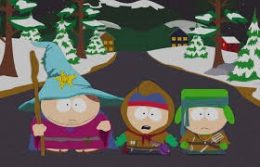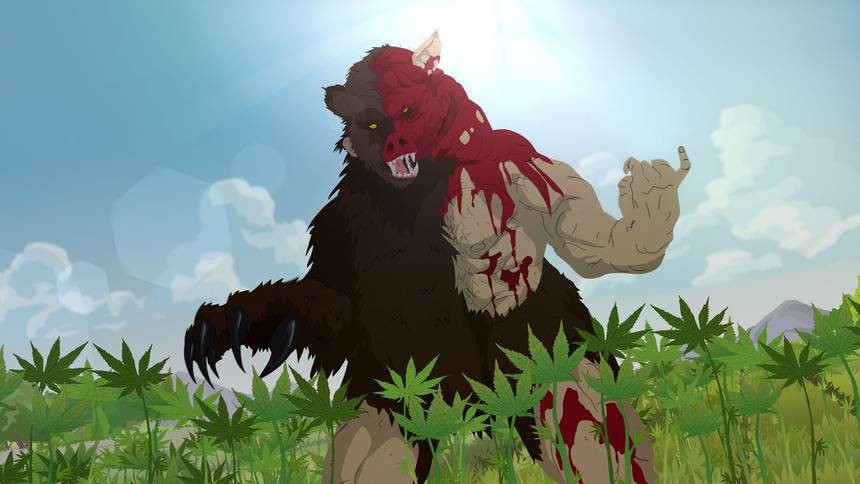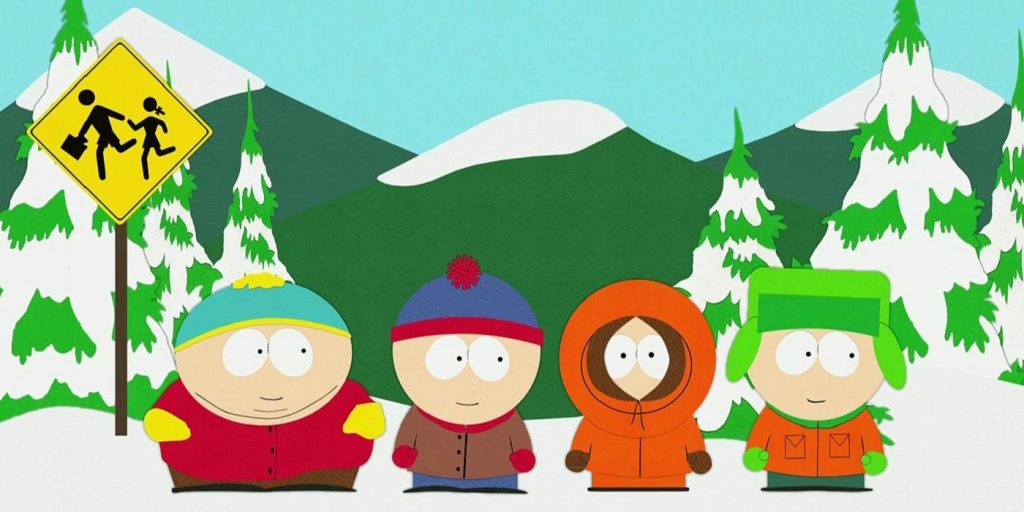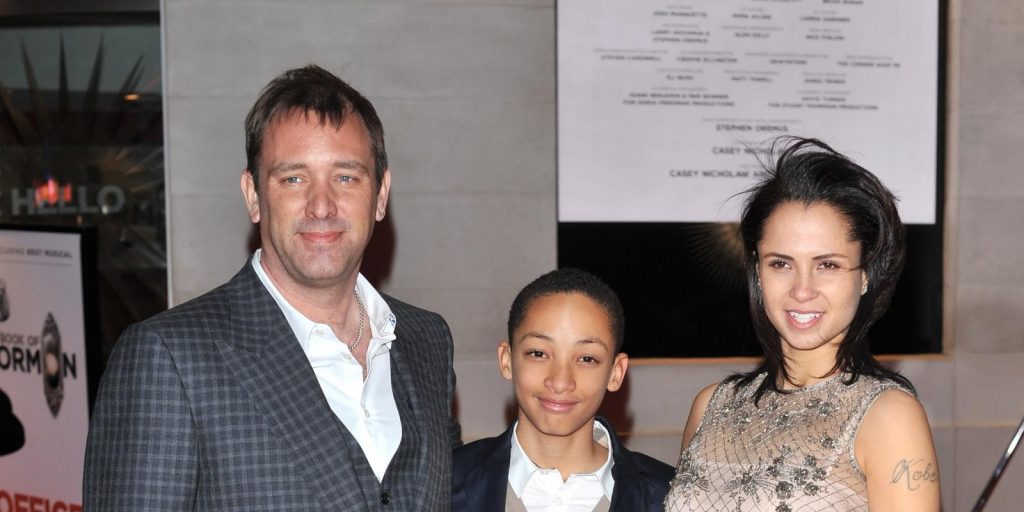The Rise & Fall of South Park, Part 1
South Park Conservatism
Posted By
Travis LeBlanc
On
In
North American New Right
| Comments Disabled
Part 1 of 2 (Part 2 here [2])
Novelist Robert Anton Wilson once famously said, “It only takes twenty years for a liberal to become a conservative with changing a single idea.”
That quote flashed in my mind a few weeks ago when I read a news story that described how Eastern Michigan University had cancelled a production of The Vagina Monologues [3] on the grounds that the play was not inclusive enough to transwomen who did not have vaginas.
I remember when the The Vagina Monologues [4] first came out in the mid-’90s. The play, which featured a series of women ranting about their vaginas, was at the time considered the cutting-edge of progressive “art,” and the hype around it was quite extraordinary. It was so brave, feminist, girl power, and all that. Over the years, there has been a plethora of all-star celebrity performances [5] of that godforsaken monstrosity. If they are famous, female, and liberal, they have probably at one time or another done a production of the Vagina Monologues. So I couldn’t help but find it amusing that it is now considered dangerously reactionary. Robert Anton Wilson’s quote still holds as true: The Left still gets Leftier by the day, just as it did in 1980, when Wilson first said it.
But now we are in the era of Trump, which is an era of polarization. Nowadays, Wilson’s knife cuts both ways. In addition to formerly liberal things now appearing conservative, things once considered conservative now seem hopelessly cucked.
Hell, it was only ten years ago when a neocon like Mark Steyn was considered an edgelord because he wrote an unapologetically Islamophobic book [6] that was somewhat woke on demographics. Steyn’s solution to the Muslim threat was to invade Muslim countries and turn them into Western-style democracies; the Muslims, of course, would feel no need to emigrate to the actual West because their own countries would already be Western. People used to think that was edgy.
It was only ten years ago when libertarian Ron Paul was our Great White Hope to overthrow the neocon establishment. Probably because he was the only person crazy enough to try.
And it was ten years ago when South Park was the best kinda-sorta Right-wing satire that we had.
These days, the Dissident Right creates all sorts of content, much of which renders the mainstream content that we used to rely upon obsolete. Obviously, we don’t need South Park anymore because we have Murdoch Murdoch [7]. We don’t need gangster rap now that we have Mr. Bond [8]. And if you want trashy gossip, we even have Ethan Ralph’s Killstream [9] to serve as a Right-wing TMZ.
Perhaps that is an unfair comparison. South Park has been very influential on the Right in ways that gangsta rap and TMZ never were. South Park is now twenty-one years old. That means South Park could walk into a bar and order a drink. But more importantly, it means we now have a generation of adults who have literally grown up on South Park, including many who are now part of the Dissident Right. Indeed, South Park may have started them on their journey here.
The makers of South Park never claimed to be Right-wing, or even to be allies of the Right, but they were fairly reliable co-belligerents. South Park hated a lot of the same people that we hated, and when South Park landed a punch, they could do some serious damage. You could never look at Jennifer Lopez, Rob Reiner, or Tom Cruise the same way again after South Park got through with them. They destroyed Scientology [10] by dramatizing the Xenu saga, forever inoculating people against the cult.
And despite being a product of the Hollywood system, South Park never quite went full Hollywood. They were most effective against narcissistic celebrities and the entertainment industry, whom they ruthlessly trolled. South Park has exposed quite a lot of loathsome characters over the years. We often talk about “meme magic,” and South Park could definitely meme.
South Park gave us the Chewbacca Defense [11]: the debate tactic of avoiding a question by overloading the listener with a bunch of irrelevant bullshit.
And then there was ManBearPig [13], the metaphor for global warming which the delusional Al Gore was perpetually chasing after in vain (because it doesn’t exist). Now, it’s one thing to criticize political correctness as South Park did. A lot of liberals think PC has gone too far. But to dispute global warming was absolute heresy to the Left. It gained South Park a lot of street cred with the Right as two guys who, even if they weren’t exactly on our side, were at least not indoctrinated and not intimidated by the Left.
South Park’s greatest contributions to the Right were in terms of style. South Park was a major part of the Right’s much-needed image overhaul. If South Park did not necessarily make it cool to be conservative, they at least made it uncool to be liberal. South Park can be seen as a sort of missing link between the Boomer-style Limbaugh/Fox News approach and the new, hip, “not your daddy’s Right-winger” millennials.
And yes, South Park was always cucked on some issues, and sometimes we took friendly fire from them, but South Park had appeal with a demographic that the Right had historically had a hard time reaching. So we were willing to let a lot slide.
But enough of all that. I come here to bury South Park, not to praise it. As a long-time fan of the show, it is high time and with heavy heart that I admit to myself and to the world that South Park has jumped the shark [15]. I intend this to be as much an obituary of South Park as an analysis.
The series has gone through hot and cold streaks in the past. It has been mediocre for long periods (usually when they were busy with other projects), only to come back better than ever. But this time, it’s different. You can just feel it. All the magic is gone. But that’s usually what happens when you sell your soul.
You see, South Park chose the wrong side in the Meme War, and in doing so, blew up their own franchise. The numbers speak for themselves.
South Park’s nineteenth season in 2015 had a debut audience of 1.76 million viewers, and averaged around 1.5 million for the season.
Then South Park went full-on anti-Trump for two seasons.
Now, here we are in 2018, in the twenty-second season. It debuted with an audience of 1.09 million, lower than the lowest-rated episode from the nineteenth season. As of this writing, no episode from this season has cracked a million viewers since the premiere.
For a show that has been around for so many years, and been consistently popular throughout, that is a shockingly fast collapse of their audience. People who had been watching them for decades have started turning them off. And the reasons aren’t difficult to figure out.
It’s one thing for Matt and Trey not to want to be associated with the labels “conservative” or “Republican,” but it’s quite another thing for them not to realize that conservative Republicans were the backbone of their fan base. Liberals had long ago written off South Park as a “Republican cartoon.”
And you would think that two people who made their reputations as contrarians would be more critical of the mainstream anti-Trump narratives, in other words being the devil’s advocates that they are famous for being. Throughout the 2000s, South Park resisted the urge to jump on the Bush-bashing bandwagon because, among other reasons, everyone else was already doing it. Well, if that was true then, it’s doubly true with Trump.
And yet since the election campaign, South Park has succumbed to Trump Derangement Syndrome as mindlessly and uncritically as any New York Times journalist. After encountering Trump, all of South Park’s subtlety and nuance went out the window. After decades of working in but not going Hollywood [16], it looks like the success of their Broadway musical caused Matt Stone and Trey Parker to “go New York.”
I don’t know what they were thinking. Maybe they thought they could make a difference. Maybe they thought they could land a knock-out blow. Maybe they thought they could do to Trump what they did to Kanye West.
Matt and Trey indeed have incredibly strong meme powers, but with Trump and Trumpism, they were dealing with forces far greater than they could possibly understand.
South Park Conservatism
South Park was the creation of two college friends from Colorado, Trey Parker and Matt Stone. The two had already self-produced two live-action comedy films. Trey Parker was obviously the real talent of the duo. While both contributed to the voice acting, Parker did the overwhelming majority of the writing and also composed all the parody songs, which spanned multiple musical genres. Trey Parker was the George Michael, and Matt Stone was the Andy Ridgley of their enterprise.
But what really stood out about them at first was their youth. Trey Parker was 27 when South Park debuted, while Matt Stone was only 26. For Gen X-ers like me, it was exciting to see people from my own generation break through and be allowed to run creatively wild. Whereas The Simpsons was entirely the creation of Boomers, South Park was made by and for Generation X-ers. Matt and Trey were the young guns there to show the old fogeys how it was done.
When the first South Park episode, “Cartman Gets an Anal Probe,” premiered in August 1997, few would have predicted that the show would go on to become the darling of conservative Republicans. Early South Park was vulgar, absurdist, surreal, and had no sacred cows. It became an overnight sensation and put the hitherto backwater cable channel Comedy Central on the map in a big way. Comedy Central had had some success with Bill Maher (who launched his talk-show career there) and The Daily Show (at that time still with Craig Kilborn, when it had an audience but had not yet become the institution it later evolved into). South Park was Comedy Central’s first major hit.
But in the late ’90s, South Park was the least interesting of the network’s major programs. A lot of its humor was based more on absurdity and shock value than true wit. But it had a lot of novelty value. It was, if nothing else, original.
But as the show progressed, South Park moved from absurdism into satire. It began experimenting and dabbling in social commentary, and slowly gained a reputation for contrarianism. Many were surprised that, despite South Park being “liberal” in style (specifically, vulgar and irreligious), it was in fact often quite conservative in substance. South Park became a guilty pleasure for conservatives, and by 2001, conservative writer Andrew Sullivan had coined the term “South Park Republican [17].” The term caught on, and before you knew it, neocons, paleocons, libertarians, and everyone in between was singing the praises of South Park. Several books have been written on the philosophical themes of South Park, including South Park and Philosophy: Bigger, Longer, and More Penetrating [18], South Park and Philosophy: You Know, I Learned Something Today, and South Park Conservatives [19] by Brian C. Anderson.
South Park Conservatism can be seen as a forerunner of what we today call the Alt Lite. In a 2003 article [20] about the phenomenon, Brian C. Anderson quoted a college student, Eric Spratling, who described it as “about rejecting the image of conservatives as uptight squares—crusty old men or nerdy kids in blue blazers. We might have long hair, smoke cigarettes, get drunk on weekends, have sex before marriage, watch R-rated movies, cuss like sailors—and also happen to be conservative, or at least libertarian.”
This was very attractive to people at a time when liberals seemed to have a monopoly on “cool.” All the “cool” rock stars, comedians, and actors were liberals, whereas the stereotypical conservative was seen, at best, as Alex P. Keaton, and at worst as a Christ-signaling moralizer.
 [21]
[21]Michael J. Fox as Alex P. Keaton in Family Ties, the definitive pre-South Park Republican stereotype.
And this was what generated a lot of Matt and Trey’s appeal. They were “cool” in the way liberals were “cool,” without being lame the way liberals are lame. As Christianity’s influence waned, South Park showed conservatives a new way to fight cultural battles against the Left — not by portraying the liberals as godless, wicked, or crazy (even though they are), but as uncool.
South Park was also woke to how liberal ideology could easily be used for personal gain by cynical bad actors. In the episode “The Death Camp of Tolerance [22],” the children’s homosexual schoolteacher Mr. Garrison learns that he can sue the school for millions were they ever to fire him for being gay. So Mr. Garrison sets about performing over-the-top gay sex acts in front of his students with his partner, Mr. Slave. While the children are appalled by this debauchery, South Park’s adults, terrified of being labeled homophobic, instead praise Mr. Garrison for his bravery, much to Garrison’s increasing annoyance.
In “The Cissy [23],” Cartman pretends to be transgendered so that he can use the school’s girls’ restroom. Again, the school faculty is petrified of being labeled intolerant, and they end up building Cartman his own restroom. Eric Cartman is an anti-Semitic [24] fascist [25], but, being a sociopath, he is more than willing to appropriate the language of PC victimology (in which he is fluent) if it helps him advance his goals.
South Park was at its strongest on three subjects: the oppressiveness of political correctness, the narcissism and shamelessness of celebrity culture and the entertainment industry, and current social trends (they were young enough to know what the kids were up to, but old enough to look at it with some detachment).
South Park acknowledged the existence of sincere liberals (often represented by Butters), but generally saw liberals as virtue-signaling narcissists hungry for power and attention, alongside approval-starved bandwagon hoppers (often represented by Stan Marsh) and various weirdos. The program loved to show how easily their rules could be subverted and abused by the Cartmans of the world.
Cartman, Jews, and Race
The j-woke [26] Eric Cartman is arguably the greatest character in the history of television. Cartman was originally conceived of as a young Archie Bunker, and like Archie Bunker, he immediately became the audience favorite and South Park’s breakout star.
Eric Cartman is the most complex character on the show. He is both the hero and the villain. He’s like Wile E. Coyote. You don’t watch to see him win. You watch because it’s funny to see him fall off a cliff over and over again.
Cartman is both the perfect bastard and incredibly based. But Cartman was what allowed South Park to take being un-PC as far as they did. By having a racist character who was also a narcissistic sociopath, they could get away with some fairly risqué racist humor. Cartman is presented as a villain, and his racism is treated as a character flaw; as a result, through Cartman, the show managed to get away with some pretty edgy stuff (by prime time TV standards) while maintaining plausible deniability. “Hey, we are not racist. It’s just this evil racist character here. We’re actually making fun of racism!” Throughout the history of South Park, Cartman has occasionally gone off on anti-Semitic conspiracy theories which are sometimes absurd (Jews are reptilians and have money caves), but sometimes Cartman has said things that would make you wonder if Matt and Trey (or someone on their writing staff) were browsing Dissident Right Websites [27].
South Park was one of the few shows that would make fun of Jews. That went too far for a lot of people. The character of Kyle Schwartz is a deliberately offensive Jewish stereotype [28], whose mother has an over-the-top New York accent, and who himself possesses a disagreeable and demanding personality.
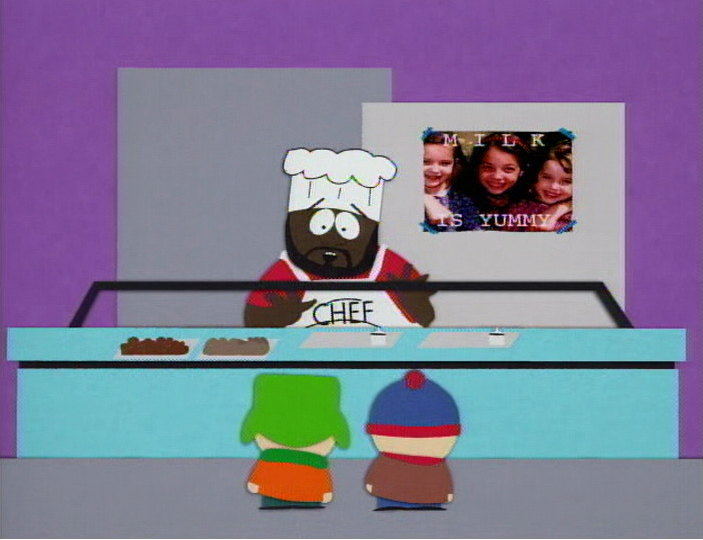 [29]South Park did have some self-imposed limitations, however. Blacks were always portrayed positively. South Park had no problem with being un-PC when it came to gays, Asians, every type of European, and even Jews, but blacks themselves were generally portrayed in a positive light. Blacks were still open game if they were assholes, but South Park never did a black stereotype as inflammatory as Tuong Lu Kim, [30] owner of City Wok, South Park’s Chinese restaurant.
[29]South Park did have some self-imposed limitations, however. Blacks were always portrayed positively. South Park had no problem with being un-PC when it came to gays, Asians, every type of European, and even Jews, but blacks themselves were generally portrayed in a positive light. Blacks were still open game if they were assholes, but South Park never did a black stereotype as inflammatory as Tuong Lu Kim, [30] owner of City Wok, South Park’s Chinese restaurant.
Chef, a popular black character in the show’s early years, served as a “wise mentor” and pseudo-father figure to the children. But Chef became less and less prominent in the show until eventually, Chef’s voice actor, Isaac Hayes, a Scientologist himself, left the show over the show’s portrayal of the cult.
And then there is Token Black, the only notable minority student at South Park Elementary.
Was South Park Ever Really that Conservative?
Having explained South Park’s appeal to conservatives, I feel we should ask: Was South Park ever really that conservative? Because perhaps answering this will give us a better idea of how much we should feel surprised or betrayed by its anti-Trumpism. Could it be that people were reading more into things than were actually there?
Obviously, by Dissident Right standards, South Park was always hopelessly cucked, but then again, so is everything else on TV. But grading on the curve? After all, it’s a prime-time TV show that has to sell advertising.
Andrew Sullivan, who coined the term “South Park Republican,” described it as people who “believe we need a hard-ass foreign policy and are extremely skeptical of political correctness.” While the second half of that is true, the South Park guys were not die-hard foreign policy hawks. Matt and Trey took a nuanced non-committal position [31] on the War on Terror. After they made several episodes [32], and even an entire movie separate from South Park (Team America: World Police [33]) satirizing the War on Terror, you still weren’t entirely sure where they stood on the matter. So it’s safe to say that Andrew Sullivan was practicing some Freudian projection there. If any South Park Conservatives were foreign policy hawks, it wasn’t because they learned it from South Park.
It is worth noting that Matt and Trey themselves have always denied being conservatives. Trey Parker said in a 2004 interview [34] that “we’re both just pretty middle-ground guys. We find just as many things to rip on on the Left as we do on the Right. People on the far Left and the far Right are the same exact person to us.” So basically, Sargon of Akkad [35]-tier centrism, horseshoe theory, and all that. For his part, Matt Stone is on record with a more encouraging statement: “I hate conservatives, but I really fucking hate liberals.”
Indeed, South Park took shots at both liberals and conservatives. However, conservatives are used to getting shat upon by TV shows, and had grown thick skin as a result. So conservatives were willing to tolerate occasional friendly fire on their sacred cows as a price of South Park’s more numerous attacks on the Left’s. Sure, South Park bashed Christianity, but so did everyone else. But South Park would also blast smug atheists. [36] And where else could you get that on TV?
After all, as imperfect as South Park may have been, it was all the Right had. In its heyday, the Left had The Daily Show, The Colbert Report, Family Guy, The Simpsons, all of stand-up comedy, sketch comedy, and plenty of sitcoms singing their tunes, and the Alt Right was more than a decade away. South Park was all the Right had, so back then it was just as well to learn to like it, warts and all.
Some have tried to square the circle by saying that South Park is “libertarian.” While they may have some libertarian tendencies in being vaguely “pro-freedom,” calling South Park libertarian still strikes me as a bit of projection. Orthodox libertarians would have left no doubt where they stood on the War on Terror. Plus, South Park has always been largely indifferent to matters like economics and the role of the state, things that obsess real libertarians.
On top of this, South Park slammed libertarian prophetess Ayn Rand in the episode “ChickenLover [37].” In that episode, police officer Barbrady is given a copy of Atlas Shrugged, which he reads and later describes as “garbage” and a “piece of shit [38].” So I’m going to go ahead say that the whole “South Park are libertarians” idea is just more wishful thinking.
To be fair, projection is not a problem exclusive to normiecons. People like to believe that Pewdiepie is a secret Nazi based on no conclusive evidence. I remember when people used to say, “Molyneux is gonna go full fash any day now! Just you watch!”
While the influence of South Park Conservatism on the Alt Lite is profound and undeniable, South Park Conservatism diverges from Alt Lite-ism in two important ways.
First, South Park has always been dismissive of religion [39]. While they acknowledge that many religious people are good and decent (they’re particularly fascinated with Mormons), South Park treats religion as a huge joke. On the other hand, almost all Alt Lite figures, from Ben Shapiro to Jordan Peterson, are pro-religion. Even degenerate race-mixing homosexual Milo Yiannopoulos plays the “I’m a devout Catholic” card. Even drug-using, butt-plugging Gavin McInnis virtue-signals his Christian faith. I’m not sure their fans really care, but for some reason they feel the need.
In this sense, anti-SJW YouTube Skeptics may be the true heirs of South Park Conservatism. And like South Park, the Skeptics have been collapsing in the face of white identity politics.
Secondly (and this one is important enough to put in all caps): SOUTH PARK HAS ALWAYS BEEN ANTI-POPULIST.
In the 2004 episode “Goobacks [40],” the city of South Park becomes infested with time travelers from the future (metaphors for illegal immigrants) who have gone back in time looking for work, and who will work for next to nothing. This naturally outrages the working-class people of South Park, who arrange a meeting where they repeatedly yell, “They took our jobs [41]!” in ridiculous Southern accents.
Matt and Trey never really attempted to make the case that these time travelers aren’t taking people’s jobs, nor do they explain why people shouldn’t be upset about it. Yet these working-class people are made the target of mockery nonetheless. The whole episode reeks of class snobbery and serves as an omen for things to come, as we shall see . . .
South Park’s aversion to populism may come from Matt and Trey’s own personal conflicts of interest. Matt Stone is Jewish, and Trey Parker has a non-white stepson by his ex-stripper wife. So one could see how they might have a reflexive aversion to populism. Because, well, you know. And because, well, you know.
If there is one somewhat consistent thread running through South Park, it’s that it is pro-status quo. The makers of South Park are not, nor have ever been, revolutionaries. They like America exactly as it is now. They don’t like liberals who want to change it into something else, and they don’t like conservatives trying turn back the clock. But South Park always spent conspicuously more time blasting liberals than they did conservatives. Maybe they thought it was more of a challenge. Maybe they were playing to their audience. Or maybe, working in Hollywood, they encounter a lot more annoying liberals than annoying conservatives, and thus get more inspiration in that direction.
But South Park’s “I’m above all this silly partisan stuff” centrism routine was easy to pull off when the overarching political dichotomy was divided between neoconservatism and neoliberalism. But in 2015, the political dichotomy began to shift toward nationalist populism versus Cultural Marxism, and no middle ground exists between them.
